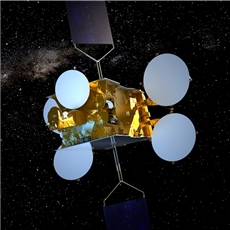
The SES-15 satellite was successfully launched onboard a Soyuz rocket
from the Guiana Space Center in Kourou, French Guiana at 08:54 local
time. This is SES’s first satellite to launch on a Soyuz rocket for a
geostationary transfer orbit mission.
SES-15 carries a hybrid payload, comprising Ku-band wide beams and
Ku-band High Throughput Satellite (HTS) capability, with connectivity to
gateways in Ka-band. SES’s first hybrid satellite will be located at
the orbital position of 129 degrees West and is equipped with 16 Ku-band
transponders (36 MHz equivalent) as well as HTS capabilities to serve
North America, Mexico, Central America and the Caribbean.
SES-15’s high throughput payload will deliver optimised and flexible
coverage for major global inflight connectivity and entertainment
(IFC/IFE) service providers, such as Global Eagle Entertainment, Gogo
and Panasonic Avionics. In addition, SES-15 has a dedicated wide beam
that is designed to enable IFC/IFE providers to deliver live TV content
on all flight routes across the US, including Hawaii and Alaska, as well
as Canada, the Caribbean and Mexico. This unique combination of beams
allows IFC/IFE providers to optimise HTS capacity use for internet
traffic and wide beam coverage for broadcast content.
“The successful launch of SES-15 is the first of our three planned
hybrid satellites, which have both wide beams and high throughput
capability. SES-15, along with the soon-to-be launched SES-14 hybrid
satellite, and our existing in-orbit satellites, offer the most
resilient aeronautical connectivity platform in North America,” said
Martin Halliwell, CTO at SES.
“SES-15 will allow us to strengthen our ability to provide next
generation services in data-intensive markets such as maritime and
corporate broadband.”
“SES is a long-standing partner, and we are delighted to be part of its
important journey in serving the ever-growing aeronautical and data
markets by successfully launching SES-15 on a Soyuz rocket,” said
Stephane Israël, CEO at Arianespace.